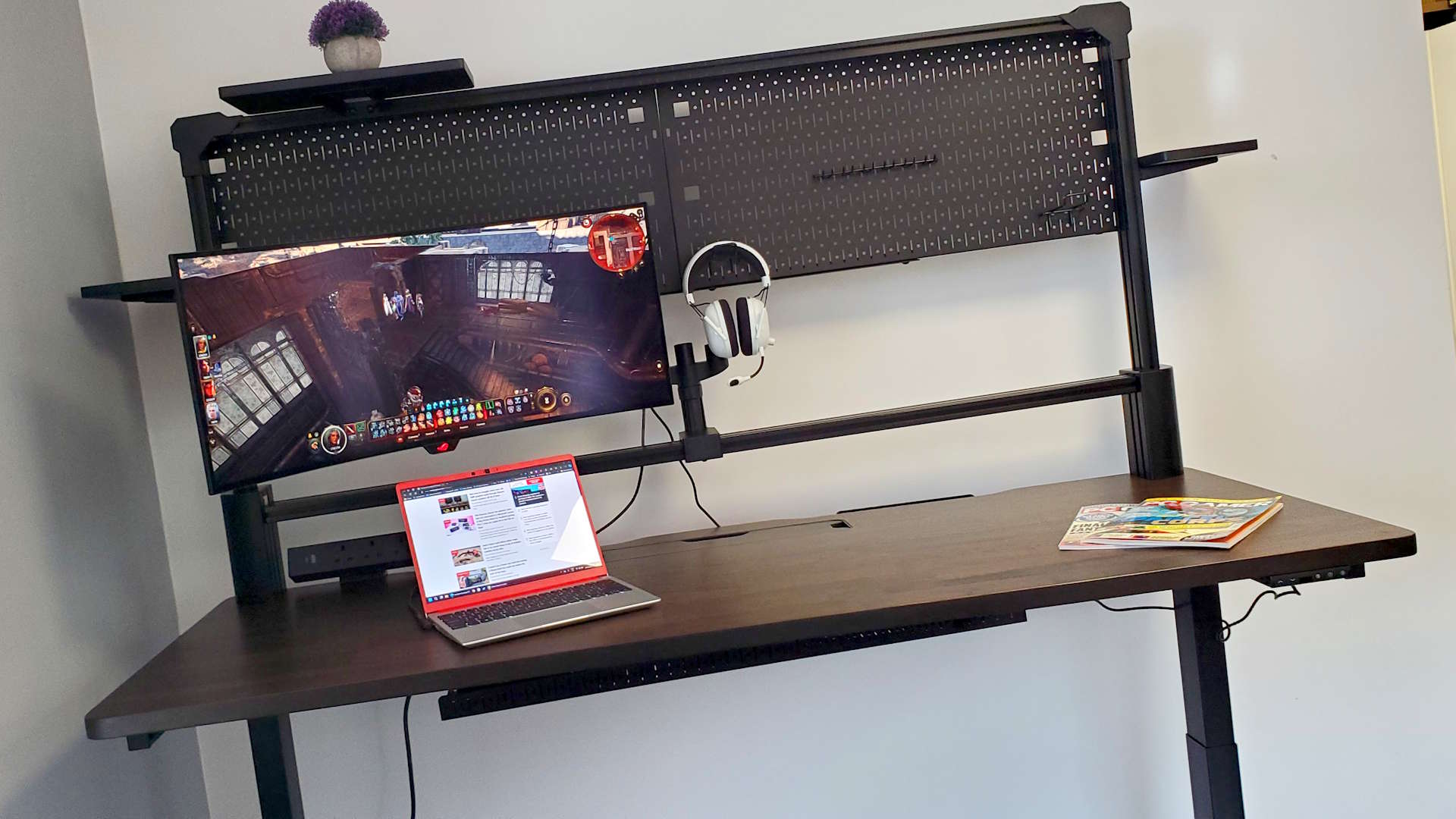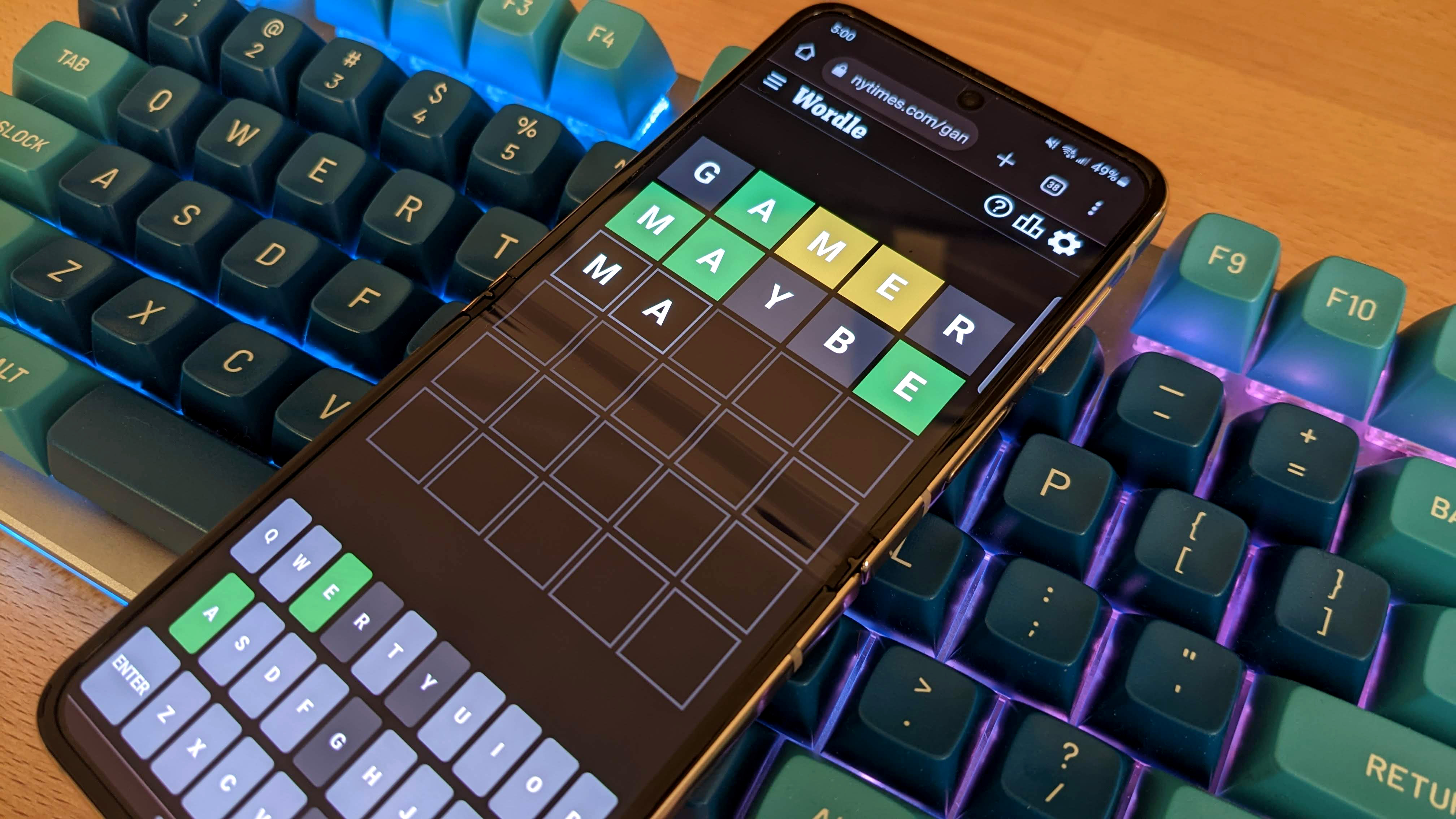
A Swiss Army Knife of a gaming desk with the promise of becoming a streaming home studio.
Furniture is expensive, right? You want a good sofa and it can cost a bomb. Hell, even plain ol’ gaming chairs are pricey. So should I be surprised that Corsair’s Platform:6 gaming desk costs an unholy amount of money? Probably not. But still, that $1,800 sticker price for this top-of-the-range Creator Edition is spit take money.
The Platform:6 is Corsair’s first gaming desk, and after creating some of our favourite gaming chairs I’ve had high hopes for its desk. And I do love a motorised sitting/standing desk. The gentle whirr of the motor, the slow ascent to a comfortable standing position, not having to be sat on my rapidly expanding posterior all day. They’re great.
And Corsair is really aiming high with the Platform:6, though there are three distinct tiers within this model: The Standard, Elevate, and Creator Edition. The first is a straight sitting desk, but it still comes with power extensions, cable tidying, cubby holes, a modular rail system and monitor arms. That’s the $1,000 version, but you can also pick up the Elevate, which brings in motorised legs to give it that sitting/standing functionality for $1,400.
Then finally you have this Creator Edition which comes with everything. Most obvious is the multi frame system bolted onto the desk, offering you extra shelving and mounting points for Elgato gear, as well as a peg board to hang peripherals from when they’re not in use. You also have extra expansion boards or further peg boards to bolt on to the side of the desktop itself.
(Image credit: Future)
Desk size: 72-inch x 30-inch (180cm x 76cm)
Desk height: 29-inch to 48-inch (74cm – 122cm)
Desktop thickness: 1-inch (2.5cm)
Power: 1x loose strip (6x plug, 2x USB-A), 1x fixed (3x plug, 1x USB-A, 1x USB-C)
Height memory: Two slots
Weight capacity: 330 lbs (150kg)
Monitor arms: Dual arms included
Elgato multi frame: Included
Price: $1,800 | £1,800
I will admit it’s a little overwhelming to get to grips with at first, owing to the fact it comes in eight separate boxes all of quite extreme weight. This was not going to be a quick build and it has taken me several office days of building, adjusting, and tweaking to get it perfectly setup.
Thankfully the instructions are mostly pretty clear, though I did end up having to fit, remove, and fit again the multi frame that sits atop the Platform:6 because the paper manual seemed to go against the labelling of the parts themselves. That was reader error, to be honest, but still a little frustrating.
Corsair does provide a whole host to tools and spares in the kit—I’ve now got more allen keys than I know what to do with, and a very handy wee ratchet—and they came in handy on a couple of occasions.
The screws and nuts are provided in numbered paper baggies (score one for sustainability) which largely correspond to where you are in the build manual, though I did find myself missing a few important screws and solitary wingnut at one point. Though with the extras in the package I was able to substitute as necessary.
Somewhat frustratingly, for such a premium-priced desk, I found instances where the machining was not quite perfect on some elements and wasn’t always able to comfortably tighten some screws so they were flush with their holes. You can feel the metal grinding at points and personally I don’t love forcing things too much in a build.
(Image credit: Future)
(Image credit: Future)
(Image credit: Future)
Though those situations are rare, they’re still there and do have an impact on your feelings of overall quality as you’re battling to build the whole setup. Something else that hit hard there is the actual quality of the desktop itself. I mean, it’s vast, and thick and the curved edges feel pleasing to the touch. But the fact that surface is a laminate was quickly highlighted when I realised—despite how careful I was being while putting it all together—there was a snag in the surface.
It was a circular cut that lead to a flap of the laminate standing a touch proud. Of course it’s my fault, I wasn’t careful enough, though I don’t really know how it happened, but I would be very disappointed that it was marked so easily and so quickly if I’d spent $1,800 on the setup.
I’m a PC gamer and a notorious PC tinkerer, but the fact it’s so easily marked would mean I wouldn’t feel at all comfortable about putting my system on its side on top of the Platform:6 to work.
I managed to mark it again affixing one of the extra side panels to the desktop by resting the spare panel on it for a moment while searching for the hex ratchet tool I needed to mount the thing. I was even very gentle placing it there knowing that I’d already gouged it once, only to find I’d scored another mark in the surface.
Again, yes, it’s my fault, but I didn’t feel I was being unduly indelicate.
(Image credit: Future)
(Image credit: Future)
(Image credit: Future)
But now it’s together and it’s a lovely thing. I have a habit of cluttering my desk with a host of peripherals, cables, and assorted bits of paper, and the multi frame peg board does appeal. Hanging my headset up there, mounting some speakers on the shelves I’ve fixed either side of it, putting my controller in place up there, it all speaks to someone who has trouble maintaining a clear desktop.
It’s also sturdy as hell. Those motorised legs betray barely a wobble when smoothly gliding up and down, nor when I’m lazily leaning against it wishing another interminable video meeting would end. It does have a sensor which slaps the motor into reverse when it comes into contact with resistance. Having a box underneath it, it reacted fairly quickly, though when I pushed Jacob under there to be my human guineapig he did confess he thought the pressure exerted upon his back from the lowering mechanism was pretty aggressive up until it gave up.
I also appreciate the space. I currently operate on a very small desktop—a hangover from being allocated a tiny corner of my home in which to work during covid lockdowns—and the 72-inch x 30-inch of desktop real estate is incredibly pleasing to sit at.
I’m sure I would quickly fill it up, however, though at least I could find a way to jam it onto a peg on the backboard.
The setup also comes with dual-monitor arms as standard, with standard VESA mountings to allow the greatest compatibility with screens. The arm I installed was quick to get into place though did struggle a little with the weight of the 34-inch Asus OLED display I attached to it. It did droop its head sadly when I first mounted the monitor, but tightening the fixings certainly helped.
(Image credit: Future)
(Image credit: Future)
(Image credit: Future)
(Image credit: Future)
Being part of the Corsair stable, and this being the Creator Edition, there are also a lot of fixin’s for Elgato products. Whether that’s a mount that sits between the dual monitor arms to affix a Facecam webcam or positions across the modular rail system or multi frame on when to fit Elgato key lights.
As the name would suggest, the Creator Edition allows you to perfectly set up your gaming desk as your studio.
It’s certainly a seriously comprehensive package, and even the fixed desk has a host of mounting points and optional extras you can pick up down the line to supplement the initial desk. But I’m struggling to decide whether I would recommend it.
Our current pick as the best overall gaming desk is the Secretlab Magnus Pro XL. It’s the same essential size as the Platform:6 (if a touch deeper) and is a motorised sitting/standing desk with optional accessories. That’s not a cheap desk in itself, being around $1,100 if you include equivalent power and monitor arm accessories, and we love it. And it’s not just because you can have LED lighting running across it.
But while it hasn’t gone for the wooden desktop experience—favouring instead a faux leather desk mat—that actually works out better in the long run. The wooden laminate of the Platform:6 is easily marked, while the faux leather is a bit more hard wearing. And has the added bonus of acting like one hoofing great mouse mat.
✅ You’re after the Swiss Army Knife of gaming desks: The Creator Edition package is swimming with different extras to kit out and personalise your Platform:6 setup to exactly how you want to use your desk area. Whether you just want to store peripherals and pot plants, or you want to set it up as your studio.
✅ You prefer the wood to Secretlab’s leather look: The laminate does look great, and if it wasn’t as prone to scratching I would prefer it to the Magnus Pro aesthetic.
❌ You have to ask how much it costs: Because if you’re asking, you can’t afford one.
❌ You want to use that surface as a PC workbench: I found the laminate wood to be easily scratched, and if you’re doing anything to your PC I can see it leaving its mark on the Platform:6.
The Secretlab certainly has more of a ‘gamer’ aesthetic to it, which the Corsair desk really isn’t going for at all. And, to a certain extent, that’s to be applauded. Without the Dave-scratched surface the wooden finish and the metal structure around it look great on the Platform:6 and I do dig the aesthetic. Maybe if it had the same surface as the Chopvalue Revive which uses recycled chopsticks, I’d be even more into it. It would certainly be more hard wearing.
I will say the Corsair is able to hold more weight than the Secretlab, and the mechanism ensures that having a PC atop it won’t impact the smooth running of the desk, or give it too much weight to deal with.
But I’m always going to come back to the price point. It feels excessive. Sure, the package is great, but I have questions over the quality of the desktop and some of the machining. When a desk is the price of a pretty high-end gaming PC I don’t want to have any questions over its quality. I want a perfect experience, from building to using, and I don’t quite get that.
This is though Corsair’s first go at a gaming desk, and it’s still an impressive debut. Given the naming scheme here I wouldn’t be surprised to see some more Platform desks appear in the future, and I’d love to see some more value-oriented version which brings the quality Corsair puts into its TC100 Relaxed gaming chair and offers that in an affordable desk.



